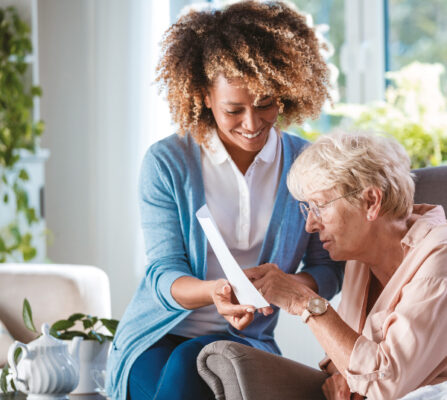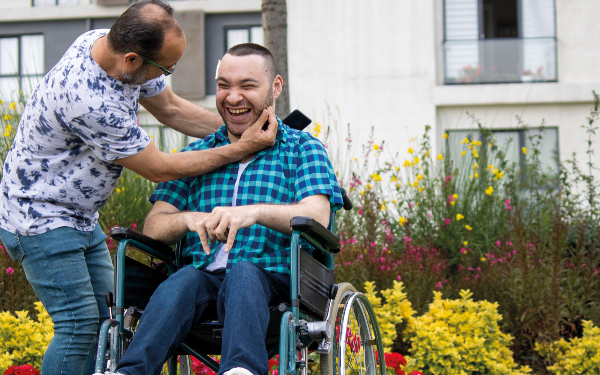Many people and carers have told us the difference that adaptations, equipment and technology make in supporting them to remain independent and enhancing the quality of their lives. As part of our adult social care strategy, we want to increase our technology enabled care (TEC) offer as part of our strengths-based approach to care and support..
At Nottinghamshire County Council, we are proud to be leading the way in using technology to support people to live the life they choose in their own home. Our commitment to early help and prevention with a TEC first approach, where technology is considered before other care and support solutions, is helping us to achieve that for people.
Innovation in practice: the care data monitoring team
At the heart of this approach is our newly developed care data monitoring team, who are responsible for interpreting data and identifying changes in people’s daily routines that may indicate a need for support. One of the key tools they use is the Intelligent Lilli activity monitoring system.
Intelligent Lilli is a discreet, free-to-use set of sensors placed throughout a person’s home, in areas like the bathroom, bedroom, lounge, fridge and kettle. It tracks movement and usage patterns, capturing information such as how often the bathroom is used, how much sleep a person is getting and the temperature of their home. It works along with smart plugs placed in the dwelling.
Over time, the system learns an individual’s routine and highlights any significant changes. This information is not only monitored by professionals but also shared with family members, providing reassurance and enabling timely, informed responses.
Here are just a few examples of how this technology is making a difference, since its use began in November 2024:
- George* lives alone, and in early December, the temperature in his home dropped by 10 degrees over two days. Thanks to the Lilli system, this was identified and flagged. A family visit revealed that the heating boiler had failed. A replacement was urgently arranged. Without this intervention, G could have been admitted to hospital with hypothermia.
- Maryam* also lives alone, and the data showed that she was visiting the bathroom more than 20 times a day. Her family was notified and a GP appointment was arranged. Tests revealed high levels of sugar in her urine, leading to a diagnosis of diabetes. Without this early intervention, her condition may have worsened, requiring acute care.
- Theresa* was receiving four care calls a day but had limited stimulation. She would often fall asleep in her chair during the day, wake in the night and call for support. A social care review led to her joining a day centre and attending church regularly. Her sleep improved, the number of emergency calls reduced and, most importantly, she continues to live independently.
24-hour support and smart safety tools
The care data monitoring team also oversees our 24-hour response service, which supports people throughout the day and night via a wearable lifeline pendant. This service often highlights the need for earlier reviews of care and support plans and targeted support, helping reduce reliance on reactive care.
 We also use a suite of additional smart tools, tailored to individual needs, during community visits:
We also use a suite of additional smart tools, tailored to individual needs, during community visits:
- Memorabel – a digital screen providing daily reminders, such as medication prompts.
- Magiplug – a safety plug that prevents flooding for those who may forget to turn taps off.
- Bed mattress sensors – these detect when a person leaves their bed, which is ideal for those at risk of night-time falls.
- Bogus call button – a discreet wall-mounted device that silently alerts a telecare centre when pressed before the person answers the door to unknown callers, offering peace of mind.
These tools, combined with professional insight and compassionate care, are enabling more people in Nottinghamshire to live well, independently and with dignity.
Join our team and make a difference
Nottinghamshire County Council is proud of the impact our technology-led approach is having – but we’re even prouder of the people behind it.
We are currently recruiting occupational therapists and social workers who are passionate about innovation, prevention and person-centred care.
Could you join a forward-thinking team that is making a tangible difference every day? Come and be part of shaping the future of social care in Nottinghamshire.
To explore current vacancies and take the next step in your career with us, visit our careers site.
*Names have been changed




 Bournemouth, Christchurch and Poole
Bournemouth, Christchurch and Poole  Hampshire County Council
Hampshire County Council  Oxfordshire County Council
Oxfordshire County Council  South Gloucestershire Council
South Gloucestershire Council  Wokingham Borough Council
Wokingham Borough Council  Providing a lifeline for social workers who want to get back into the sector
Providing a lifeline for social workers who want to get back into the sector  The highs and lows of a children’s services’ transformation journey
The highs and lows of a children’s services’ transformation journey  Embedding learning in social work teams through a multi-agency approach
Embedding learning in social work teams through a multi-agency approach  The family safeguarding approach: 5 years on
The family safeguarding approach: 5 years on  Harnessing social work values to shape your career pathway
Harnessing social work values to shape your career pathway  Workforce Insights – showcasing a selection of the sector’s top recruiters
Workforce Insights – showcasing a selection of the sector’s top recruiters  Join our team to help technology enabled care transform lives in Nottinghamshire
Join our team to help technology enabled care transform lives in Nottinghamshire  Free CPD on Parkinson’s for health and social care staff
Free CPD on Parkinson’s for health and social care staff 

 Facebook
Facebook X
X LinkedIn
LinkedIn Instagram
Instagram